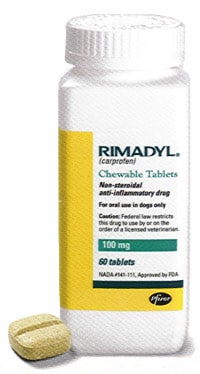Rimadyl® (carprofen) is a non-narcotic, NSAID (Non Steroidal Anti-Inflammatory Drug) used for the relief of pain and inflammation associated with canine osteoarthritis. While Rimadyl® is not a cure for osteoarthritis, it can relieve the pain and inflammation associated with osteoarthritis, and improve mobility an activity (Dr. P could use this stuff after his Tuesday basketball game!). Response varies from dog to dog but can be dramatic. Improvement can be seen in a matter of days in most dogs. Our arthritis page has substantial information on how you can treat this problem with many other modalities in addition to NSAID’s like Rimadyl.
Rimadyl is also approved for the use of pain in animals. It is used post-operatively in many surgical procedures.
Indications
Rimadyl® is indicated for the relief of pain and inflammation associated with osteoarthritis in dogs. Rimadyl® is a prescription medication, only for use in dogs, and is available only through licensed veterinarians.
Dosage and Administration
Both Rimadyl® chewable tablets and caplets are scored. Each chewable tablet or caplet contains 25, 75, or 100 mg of carprofen and come in bottles of 14, 60, or 180 for monthly dispensing.
Rimadyl® is given by mouth, generally twice a day, and may be given with or without food. Please monitor your dog closely for possible adverse events associated with any increase in dose. Every 6 months your dog will need a blood panel and examination prior to refilling your dog’s prescription.
 |
Treatment success is largely due to following instructions carefully: 1. Give the medication when directed 2. Give the medication as often as directed 3. Give all the medicine prescribed 4. Report anything unusual to your veterinarian as soon as possible |
A printable “Signs of arthritis Progress Report Form” is available to assist in monitoring signs of arthritis while taking Rimadyl®. [view PDF form]
Mechanism of Action 2
The mechanism of action of Rimadyl®, like that of other NSAID’s, is believed to be associated with the inhibition of cyclooxygenase activity. Rimadyl® has also been shown to have modulatory effects on both humoral and cellular immune responses. Data also indicates that Rimadyl® inhibits the production of osteoclast-activating factor (OAF), PGE1, and PGE2 by its inhibitory effect in prostaglandin biosynthesis.3
Efficacy
A blinded, placebo-controlled, multi-university study assessed the efficacy of Rimadyl®:1
Objectively with force plate gait analysis
Subjectively with veterinarian evaluation based on physical examination, clinical signs, gait and mobility observations, and graded lameness evaluation
Subjectively with owner evaluation based on improvement in mobility and activity levels.
Dogs with hip arthritis treated with Rimadyl® showed statistically significant improvement compared to placebo-treated dogs regardless whether the assessment was made by an objective force plate gait analysis or subjective human (veterinarian and owner) observations.1
Safety
As with other pain relievers in this NSAID class, rare but serious side effects involving the digestive system, kidneys or liver may occur. Of course, regular monitoring is required for pets on any medication. an examination should be performed and blood panel should analyzed prior starting your pet on this medication. One month after starting Rimadyl® the blood panel should be repeated to make sure there are no internal side effects.
Signs to look for include: increase or decrease in appetite, vomiting, diarrhea or black/bloody stools, behavior change (increased or decreased activity level, incoordination, seizure, aggression), jaundice(yellowing of gums, skin, or whites of the eyes), change in drinking habits (frequency, consumption), change in urination habits (frequency, color, or smell), or change in skin (redness, scabs, scratching). If you think there is a problem, stop giving the medication and contact your veterinarian as soon as possible.
In clinical trials, incidence of inappetence, digestive upset, and behavior changes was 4% or less. The reported rate of possible adverse drug events is 0.18% (or less than two-tenths of 1%) in treated dogs. Signs of Rimadyl® intolerance may include appetite loss, vomiting, diarrhea, liver, or kidneys problems. Vomiting and diarrhea could indicate rare, but serious side effects of the digestive system.
Rimadyl® is contraindicated for patients with known hypersensitivity to this drug. The safety of Rimadyl® in breeding, pregnant and lactating bitches, and breeding dogs has not been determined.2 The safety of Rimadyl® in dogs with bleeding disorders (e.g., Von Willebrand’s disease) has not been determined.2 Rimadyl® is approved for use in dogs only.
Additional Reading:
1. Beale B, Fox S; Pfizer Animal Health Advances No. 1; The Science of Evaluating Lameness and Pain Relief. [view document]
2. Budsberg S, Fox S; Pfizer Animal Health Advances No. 2; The Science of Articular Cartilage and Its Deterioration During Osteoarthritis. [view document]
3. Hodge M; Three Years (1997-1999) of U.S. Clinical Experience With Rimadyl® (carprofen); Pfizer Animal Health Technical Bulletin, Dec 2000. [view PDF format]
You will need the Adobe Acrobat Reader to view and print the bulletins and forms, which are in PDF format. If you already have Acrobat® Reader, you can immediately download and print the documents. If you need a copy of the Adobe® Acrobat® Reader®, click the icon below to download it free of charge from Adobe®.
References:
1. Beale B, Fox S; Pfizer Animal Health Advances No. 1; The Science of Evaluating Lameness and Pain Relief.
2. Budsberg S, Fox S; Pfizer Animal Health Advances No. 2; The Science of Articular Cartilage and Its Deterioration During Osteoarthritis.
3. Hodge M; Three Years (1997-1999) of U.S. Clinical Experience With Rimadyl® (carprofen; Pfizer Animal Health Technical Bulletin, Dec 2000.
Developed for Long Beach Animal Hospital, by Glenna M Gobar DVM, MPVM, MS, courtesy of Pfizer Animal Health; Sept 2001

